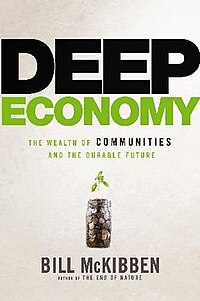Deep Economy
This article is actively undergoing a major edit for a little while. To help avoid edit conflicts, please do not edit this page while this message is displayed. This page was last edited at 18:12, 24 July 2009 (UTC) (15 years ago) – this estimate is cached, . Please remove this template if this page hasn't been edited for a significant time. If you are the editor who added this template, please be sure to remove it or replace it with {{Under construction}} between editing sessions. |
 | |
| Author | Bill McKibben |
|---|---|
| Genre | non-fiction |
| Publisher | Henry Holt & Company |
Publication date | March 2007 |
| Pages | 271 |
| ISBN | 9780805076264 |
Deep Economy: The Wealth of Communities and the Durable Future is a non-fiction work by environmentalist Bill McKibben published in 2007 in the field of ecological economics. It promotes sustainable economy through close communities, with regions generating their own food, energy, culture and entertainment. In an interview with Salon.com, McKibben defined a "deep economy" as one that "cares less about quantity than about quality; that takes as its goal the production of human satisfaction as much as surplus material; that is focused on the idea that it might endure and considers durability at least as important as increases in size."[1] The book has been generally well-received, though some critics have questioned his proposed solutions.
Overview
McKibben questions whether the long-standing presumption that "more" equals "better" in economic growth is a valid one, suggesting that unfettered growth is not a realistic, sustainable goal. According to McKibben, this mindset resulted from the 1712 invention of the steam engine and the Industrial Revolution which rapidly altered expectations of economic growth. According to him, the current political assumption ignores both the problems of resource depletion and inequity, which leads to human unhappiness. Instead, McKibben suggests that the focus should be on "deep economy", which includes a consideration of human satisfaction, rather than constant growth.
As an example of the problem with current philosophy, McKibben focuses extensively on global, industrial agriculture, which he argues has endangered localized farming communities, damaged the environment, increased the risk of terrorist sabotage of a central food supply, increased food-borne illnesses, led to more mistreatment of farmworkers, and sped the depletion of water and oil. The solution to these problems, he suggests, is community-centered farming as currently practiced in Cuba, with similar projects in New England and Detroit. He also examines the Western world's attitude towards economic inequity. The mega-rich are praised and admired, a symptom of the "hyper-individualization" that McKibben regards as a social failure, ecologically, politically and morally. Human beings are more psychologically healthy, not to mention happy, when part of a community, and accordingly community-based economies, wherein goods are locally produced and consumed, foster neighborliness and happiness.
To the end of fostering close communities, McKibben offers several suggestions, ranging from encouraging the use of public transportation to offering a close living environment where multiple residents share living spaces in interconnected condominiums, from developing sustaining alternate energy sources to developing and utilizing a local currency (such as BerkShares) in addition to a national one.
By contrast to such economists and commentators as Deirdre McCloskey, Thomas Friedman and Jeffrey Sachs, McKibben does not promote globalization in the developing world, which he views as ineffective means of raising standard of living and unsustainable given limited global resources.
Critical reception
The book has been generally well-received, with critics praising the presentation though sometimes questioning his solutions. Preceding their interview with the author, Salon.com describes his future as "credible" and his account of the problems the world faces and the path to the current crisis "compelling."[1] Bloomberg suggests that "the book is given to one-sidedness and oversimplification", with answers that may not be workable, but adds that it isn't gloomy or "tedious...: it has barely a dull sentence" as McKibben "makes his case with flair and a wealth of fascinating detail...."[2] The New York Times notes that the book "suffused with a certain Vermontlichkeit", offers the occasional "ghastly idea", but says, "It would be unwise to dismiss McKibben’s ideas as pipe dreams or Luddism. He makes his case on anecdotal, environmental, moral and, as it were, aesthetic grounds."[3]
References
- ^ a b Boudway, Ira (March 23, 2007). "Bill McKibben says we're stuffed". Salon.com. Retrieved 2009-07-24.
- ^ Tannenbaum, Jeffrey (April 2, 2007). "Why Growth Is Bad, Gardens Good and Cuba Key to Oil-Free Future". bloomberg.com. Retrieved 2009-07-24.
- ^ Morrow, Lance (April 22, 2007). "Be My Neighbor". New York Times. Retrieved 2009-07-24.
Further reading
- Kanner, Matt (02 August 2008). "Bill McKibben gets deep on the economy". The Wire. Retrieved 2009-07-24.
{{cite web}}: Check date values in:|date=(help)
External links
- "Diving into Deep Economy", OneBookUTA, University of Texas at Austin.
- Bill McKibben: "Deep Economy", Interview. KQED-FM.
Resource economics Ecological economics Environmental economics
